Business
How to protect your business from the volatility of the naira

The latest earnings results on the NGX show that blue-chip brands that include Airtel Africa, Guinness Nigeria, Nigerian Breweries, and Cadbury Nigeria lost a significant amount of money due to FX exposures.
An abysmally wide gap has emerged between the official rate and the black-market rate (N870/$) because of a dollar shortage at the official market. In addition, the naira-dollar exchange rate recently sold off at an intraday high of N869/$1 at the counter for investors and exporters.
With the Federal Reserve announcing hawkish plans to combat inflation, it seems likely that the USD will remain volatile and the currency of choice in an uncertain FX market in Nigeria
Making the most of international opportunities means setting up your business for seamless foreign currency transfers, as well as making sure you stay smart about exchange rates and other potential fees.
As exchange rates fluctuate, you may find your costs go up and your profits go down. However, there are some things you can do to protect your business and profits.
Direct Hedging
Direct hedging is the most common simple hedging strategy.
The institution takes a long position in a currency pair while simultaneously taking a short position in that same pair.
Direct hedging is not a way of making money as it rarely generates a net profit.
However, it provides relatively effective protection against currency fluctuations, allowing companies to make bolder operating decisions knowing that there is a degree of consistency against exchange rates.
Early payment is encouraged
If you face currency fluctuations because you sell to international customers, setting up payment terms upfront is the easiest way to protect yourself.
Requiring all or part of a prepayment from a customer means eliminating or reducing the risk of exchange rate fluctuations between the time you accept the contract and the time you get paid.
If you’re concerned that customers won’t respond well to immediate payment terms, offering an early payment discount will encourage them to choose this option.
Discounts or other incentives, such as credits for future purchases, give your customers a financial reason to pay sooner.
Forward contracts
Forward contracts are one of the safest ways to protect your business against currency fluctuations.
These allow you to pre-set the exchange rate at which you will buy or sell but only pay for it at some point in the future when you really need it.
For example, imagine that you are about to purchase some $5,000 worth of goods from a supplier in the United States.
The payment terms you have agreed to state that you will pay the supplier for these supplies when you receive them, within six months.
Between the end of the deal and the actual payment for the supply, the greenback could strengthen, and you’ll end up paying more naira than expected.
However, if you buy a forward contract, you can agree to buy $ 5,000 six months from now at today’s exchange rate.
This means you are protected from paying extra.
Rolling Hedge
Companies that are frequently exposed to exchange rate fluctuations can use swaps or options to hedge against currency fluctuations.
Alternating hedging helps reduce risk by closing a hedging product that is about to expire (such as a futures or options contract) and at the same time opening a new contract, pushing back the expiration date of the original insurance product.
Bottom line
While past trends cannot accurately predict the future stability of a currency, if you have a choice between a stable currency and an unstable currency, think carefully about where you want to invest your money. High-risk strategies can certainly work, but make sure your portfolio or business can survive a negative outcome in case currencies continue to fluctuate.
Business
Wale Edun submits new minimum wage options, associated costs to Tinubu

Wale Edun, minister of finance and coordinating minister of the economy, has submitted new minimum wage options and projected cost implications to President Bola Tinubu.
On Tuesday, Tinubu directed Edun to present a proposal on new minimum wage figure and analysis of the associated costs within 48 hours.
Business
Labour resumes talks with FG, says no new minimum wage offer presented yet
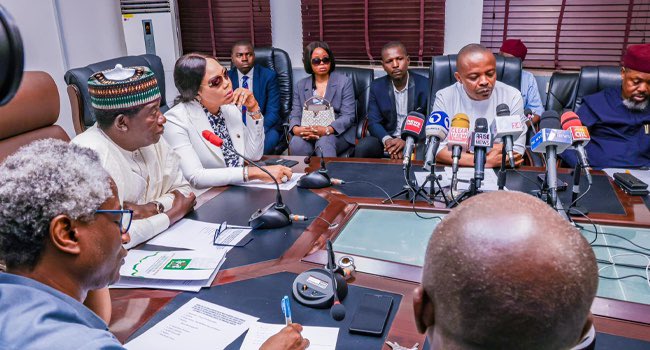
Members of the tripartite committee, comprising the federal government and labour unions, have resumed talks on a new minimum wage for Nigerian workers.
The committee reconvened at the Nicon Luxury Hotel in Abuja on Wednesday.
Speaking with journalists after the meeting, Festus Osifo, president of the Trade Union Congress (TUC), said the federal government did not present a new minimum wage offer during the talks.
“Nothing has been presented yet. The minister of finance said they are still working on the template that the president mandated them to work on,” he said.
“All we were discussing were the principles behind some of these issues, but they have not presented anything beyond what was presented earlier.
“We hope when we come back tomorrow, we will have something to relate to.”
The federal government was represented at the meeting by Wale Edun, minister of finance; Atiku Bagudu, minister of budget and national planning; and Nkeiruka Onyejeocha, minister of labour.
Representatives of the secretary to the government of the federation and the head of service of the federation were also present.
For the organised labour, Joe Ajaero, president of the Nigeria Labour Congress (NLC), and Osifo were in attendance.
Abdulateef Shittu, director-general of the Nigeria Governors’ Forum (NGF), was also present.
On Monday, the NLC and TUC embarked on an indefinite strike over the federal government’s failure to meet their demand for a new minimum wage.
The organised labour had proposed N615,500 and N494,000 as the new national minimum wage, which the government said was unrealistic.
On Tuesday, the organised labour relaxed the industrial action for one week to allow negotiations with the federal government on a new minimum wage.
Business
First Bank recovers N456 Billion loan from Heritage Bank before license revocation
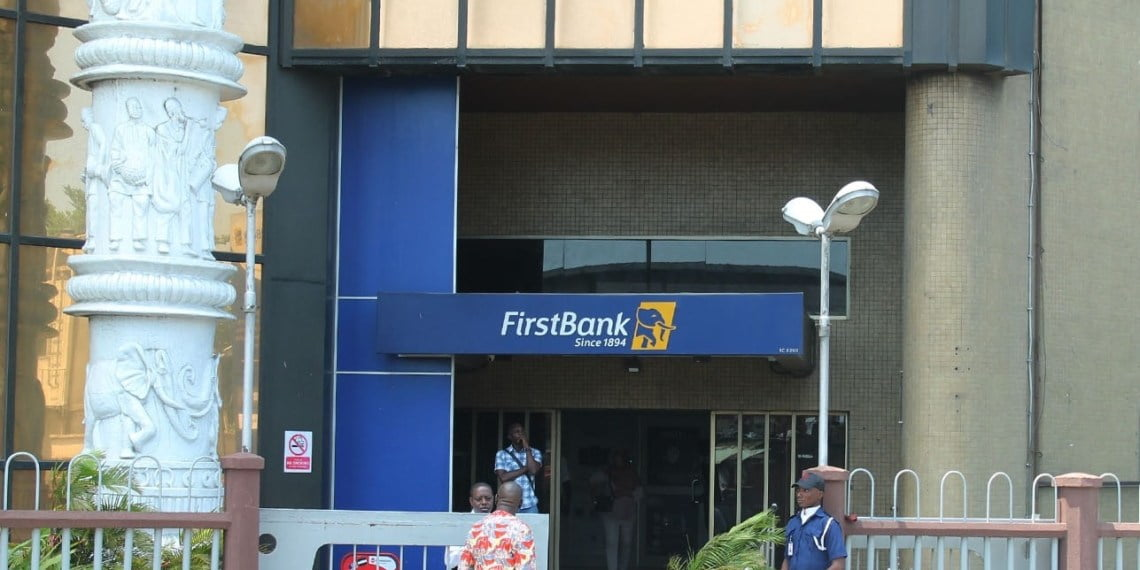
According to reports, First Bank has received the full repayment of a “N456 billion loan” extended to Heritage Bank.
This recovery is part of a “bailout loan” arranged during the tenure of former Central Bank of Nigeria (CBN) Governor Godwin Emefiele.
According to top sources from First Bank, the CBN credited the tier-one bank prior to its decision to revoke Heritage Bank’s license, thus averting what could have been a significant impairment charge for First Bank.
On Monday, the CBN announced the revocation of Heritage Bank’s license, stating that “the bank has continued to suffer and has no reasonable prospects of recovery,” which led to the bank’s eventual collapse.
Details of the Payment
Verified information from newsmen indicates that the actual amount received by First Bank was N456 billion, concluding a seven-year wait since First Bank supported Heritage Bank in clearing.
First Bank’s financial statements reveal that the bank held balances with other banks amounting to N688 billion as of the first quarter ending March 2024, down from N735 billion in December 2023.
According to First Bank, these balances include clearing balances with other deposit money banks. First Bank provides clearing services for some banks in Nigeria, and the current balances within Nigeria include clearing exposures to banks as of December 31, 2023.
Push for Recovery: Efforts to recover the N456 billion loan intensified as Heritage Bank’s situation worsened over the years. However, a resolution was not reached until a new board and management took over the holding company of the bank earlier this year.
The amount was eventually credited to First Bank ahead of the official announcement of Heritage Bank’s license revocation, ending the seven-year wait.
This payment is expected to be reflected in FBN Holdings’ half-year financial statements, bolstering its cash positions and preventing the bank from incurring a write-off for the loans.
FBN Holdings reported a pre-tax profit of N358.8 billion in the first quarter of 2024, alongside an impairment provision of N227.4 billion.
Heritage Bank’s troubles began in 2019 when it faced severe distress and appeared on the verge of collapse. However, under Godwin Emefiele, the CBN pursued a policy of not allowing banks to fail, supporting Heritage Bank through various measures.
First Bank was given the green light by the CBN to backstop Heritage Bank’s clearing obligations.
Clearing in Nigerian banks refers to the process of settling financial transactions between banks, ensuring the correct transfer of funds from one account to another.
This process is vital for maintaining the banking system’s integrity and efficiency, involving several steps and mechanisms to facilitate the smooth exchange of financial instruments such as checks and electronic funds transfers.
Banks excluded from the clearing process are technically insolvent, indicating distress and preventing further exposure by other banks.
However, under Emefiele’s policy, the CBN supported Heritage Bank through First Bank, issuing a “Letter of Comfort” to the tier-one bank. This guarantee ensured that First Bank did not have to make significant provisions for the loan.
Auditors had often requested a provision for the loan, but this request was repeatedly dropped due to the CBN’s letter guaranteeing loan repayment.
This successful loan recovery is a significant financial maneuver for First Bank, reflecting strategic financial management and timely intervention by regulatory authorities to maintain stability within Nigeria’s banking sector.
According to information contained in the 2021 audited financial statement of the bank at a negative reserve of N230.8 billion as of December 2021. The bank had a share capital of just N53.9 billion and accumulated losses of N459.3 billion making it technically insolvent.
As of 2021, Heritage Bank reported it had a balance of N247 billon as balances due to banks in Nigeria. The bank also cited First Bank as the only bank owed the amount at the time. It is likely that the N456 billion paid to First Bank includes accumulated interests.
Heritage Bank is yet to make public its 2022 and 2023 financial statements.
-
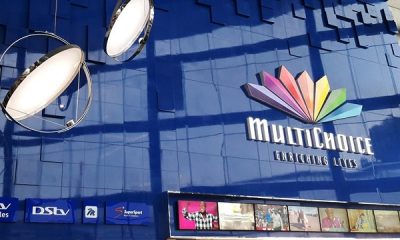
 Business2 days ago
Business2 days agoMultiChoice board backs Canal+ $2.9bn buyout offer
-

 Business3 days ago
Business3 days agoOPay, Kuda resume onboarding of new customers as CBN lifts restriction
-

 Crime5 days ago
Crime5 days agoCodeine syrup, Loud consignments worth over N2.1billion intercepted at Lagos, P/H ports
-

 News7 days ago
News7 days agoLASTMA issues travel advisory around VI, Lekki corridor
-
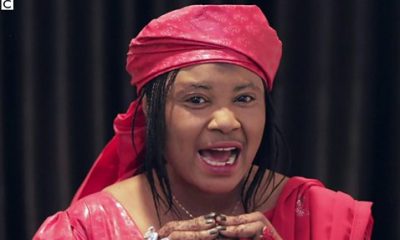
 Entertainment1 week ago
Entertainment1 week agoKannywood actress Fati Slow is dead
-

 Sports1 week ago
Sports1 week agoBayern Munich confirm Kompany as new head coach
-

 Crime1 week ago
Crime1 week agoEFCC arrests man for spraying naira notes in Gombe
-
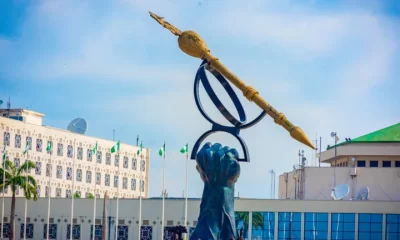
 Politics5 days ago
Politics5 days agoNational Assembly disowns bill seeking return of Nigeria to regional government


















